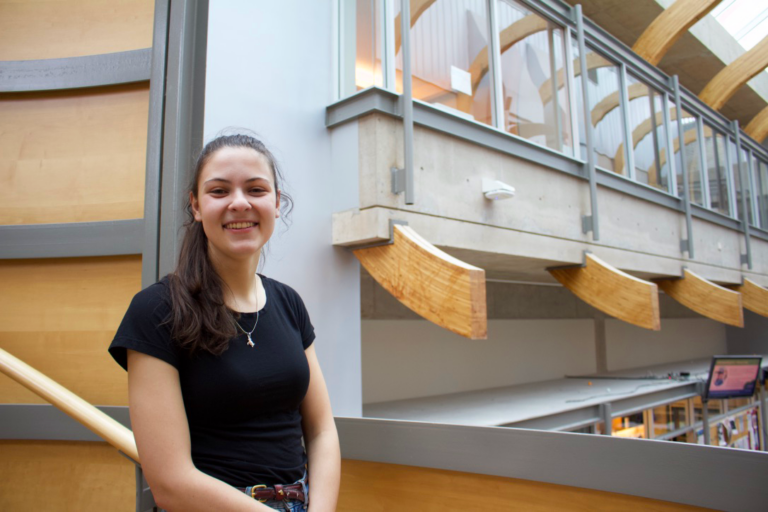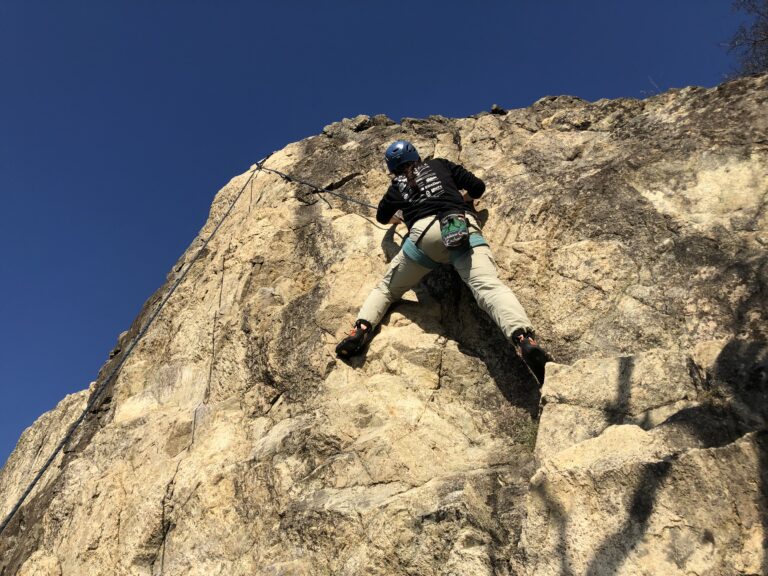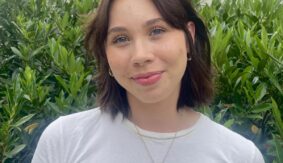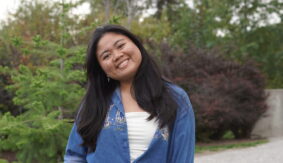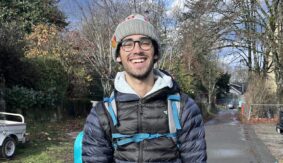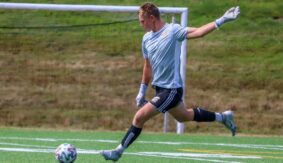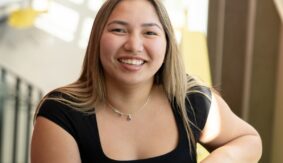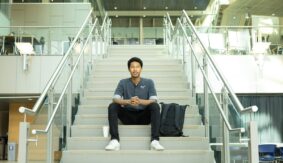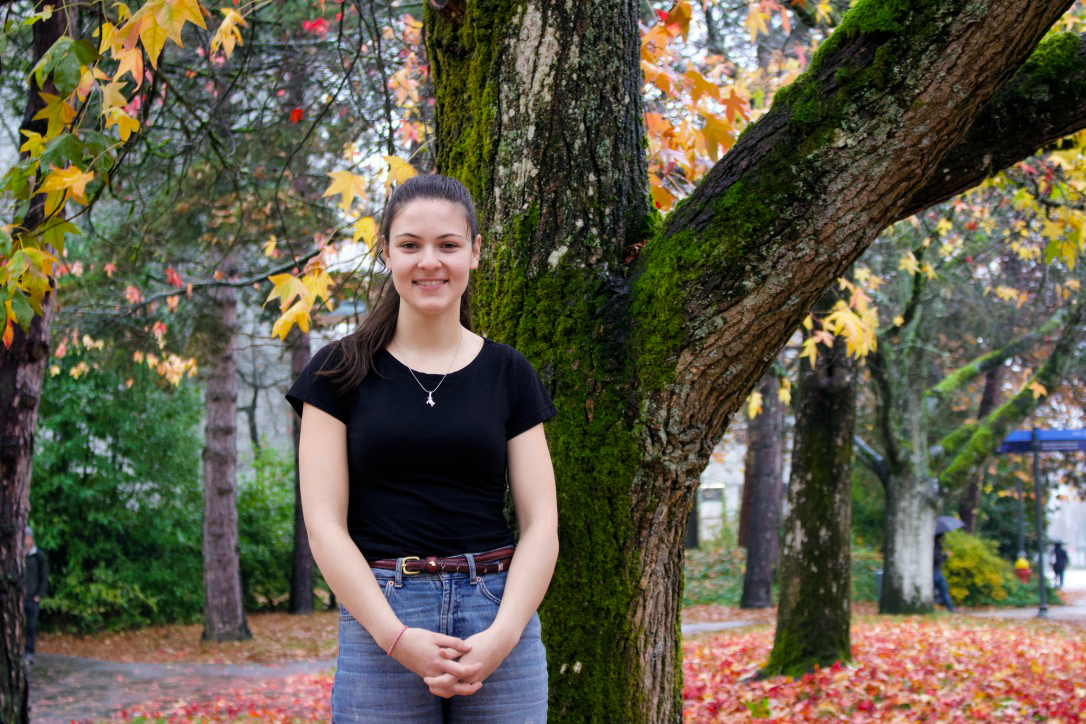
Nadine Truter wanted to study Biomedical Engineering at UBC so she could make a difference to people’s lives.
Before applying to UBC, Nadine wasn’t sure which branch of engineering to pursue. She decided that the biomedical field would help her make the biggest impact, and discovered a strong community with the other students and professors in the close-knit program. Now in her third year, Nadine is specializing in cellular bioengineering, where she will be learning how to design treatments at a molecular level.
What big questions did you have before arriving at UBC?
Before coming to UBC I was very unsure about what I wanted to do, what field to choose, and what to expect of my future. I decided to go into engineering, but wasn’t sure about what type of engineering most interested me. What I did know is that I wanted to have a positive impact on the world in one way or another – the next step was to determine how I would do it.
Can you describe what biomedical engineering is?
Depending on who you ask or where they come from, the answers will vary greatly. The reason is that biomedical engineering is an extremely broad field, ranging from designing prosthesis, working with human tissues, analyzing genes and proteins to determine the origin of a disease, or creating instruments used in hospitals. My personal definition is that biomedical engineers use engineering skills and knowledge and apply it to biological systems to either improve someone’s health in a preventative manner, or by treating an existing condition.
What do you most enjoy about the program?
In a general way, the best part of this program is the potential we all have to make a change in people’s lives. On a day-to-day basis, this program is great because of how close-knit everyone is. We’re all supportive of one another and have formed a community between the students, professors, and coordinators. The professors have all been great so far, and really want to prepare us for the whatever we choose to do after graduation. It’s also excellent that there are options to customize the degree to suit what you want to achieve by allowing you to pick courses from other streams in the program.
The best part of this program is the potential we all have to make a change in people’s lives
Do you know what you want to do after you graduate?
The biomedical engineering industry is changing so quickly that I don’t have a specific career in mind. I know that it’s very likely as I go along in my studies and my career that new opportunities will present themselves. With that being said, I’m interested in the cellular bioengineering stream because I’m keen on developing a drug, therapy, or some treatment for diseases.
Are you involved in any student societies?
I’m a co-president of the Biomedical Engineering Undergraduate Student Association, so I’m involved in planning and organizing all the events we host. Those include professional development and social events, communicating between the faculty and student body, and much more. I have a personal goal to make this program an amazing, reputable program for the years to come since there is still a lot of flexibility for change.
What do you like to do at UBC outside of your academic work?
I am in two clubs currently – the Varsity Outdoors Club (VOC), and Concrete Toboggan. Being involved with VOC has inspired me to live a more active lifestyle outside of my academics by doing things such as rock climbing weekly at The Aviary in the Nest, and biking to school. I am a regular member on the club which means I have access to the rental of their gear, and I can attend trips hosted by its other members, or host my own trips.
This is my second year as a member of Concrete Toboggan. There are many sub-teams involved in designing the final toboggan used during the competition in January. I am on the superstructure sub-team, which designs and fabricates the roll-cage of the toboggan and its braking system. I have recently expanded my limited skills in SolidWorks by modelling the roll-cage that we designed at meetings.
My time at UBC has helped me develop as a person and understand who I am.
What would you say to prospective students who are considering attending UBC?
If you don’t mind a bit of rain here and there, UBC is a great university. There are many opportunities to develop yourself as an individual and expand your connections in your field, so don’t be afraid to go out and take them! You can join clubs, go to office hours (professors genuinely want to help you succeed, I promise), talk to people you see every day in your classes, attend big events, attend small events, or try a new restaurant. It may be a big university – which can be intimidating for some people – but that just equates to many exciting possibilities! Getting involved will make a huge difference in your university experience.
What has your UBC experience helped you achieve so far, and how?
So far, my time at UBC has helped me develop as a person and understand who I am. I have learned skills that will be necessary and beneficial to have in a workplace, such as hands-on experience in laboratories, problem solving skills (theoretical and applied), teamwork, communication skills, research abilities, and presentation skills. I have also made friends that have already been by my side through thick and thin, and continually help me improve in various aspects of my life, such as mental and physical health.
